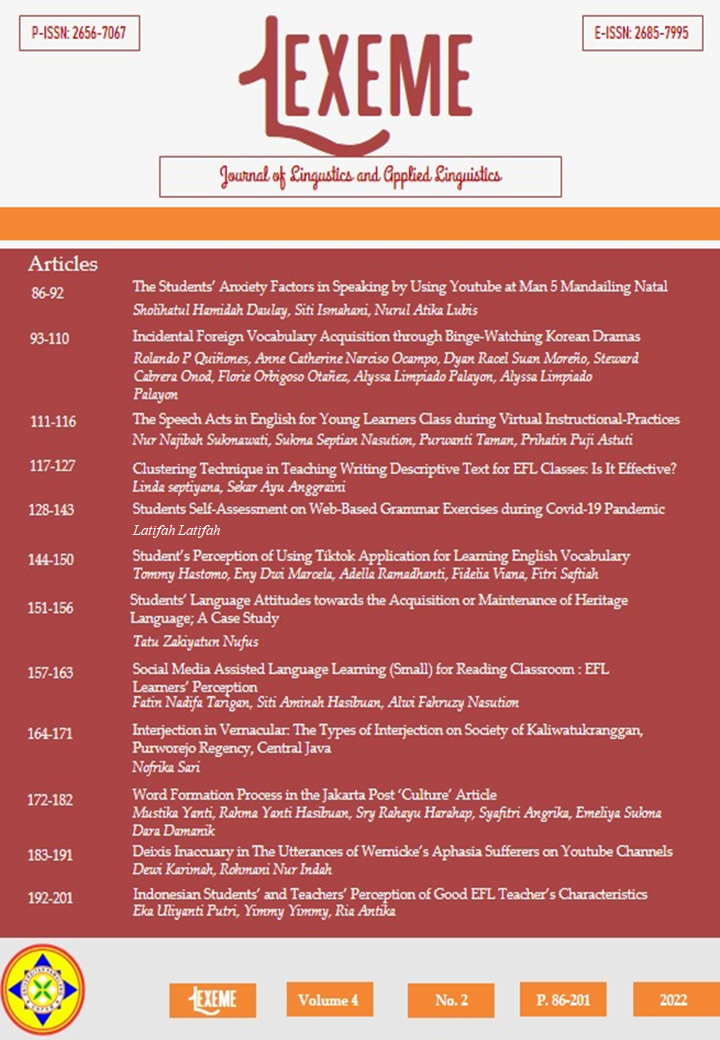STUDENT’S PERCEPTION OF USING TIKTOK APPLICATION FOR LEARNING ENGLISH VOCABULARY
DOI:
https://doi.org/10.32493/ljlal.v4i2.20429Keywords:
Students’ perceptions, TikTok, VocabularyAbstract
This research goal is to find out about students’ perceptions of using TikTok in learning English vocabulary, which was carried out in the second semester of English education at STKIP PGRI Bandar Lampung. This study is a descriptive quantitative study in which data were collected by filling out a questionnaire by 25 students. The study results found that almost all students showed a satisfactory reaction to the TikTok apps for English learning vocabulary, which can be seen from the percentage of the questionnaire they filled out as participants. The students also agreed that TikTok helps them in learning English vocabulary. They can use TikTok anytime and anywhere to learn English vocabulary. TikTok video allows them to choose the topic of vocabulary that students want to improve, and the students agree TikTok help the students easily memorize the new English vocabulary that students have learned.
References
Ahmad, Syarwan, T. Zulfikar, and Fitri Hardiana. 2020. “The Use of Social Media Whatsapp Among English Education Students for Solving Thesis Writing Problems.†Humanities & Social Sciences Reviews 8(3): 447–55.
Al-Maroof, Rana et al. 2021. “The Acceptance of Social Media Video for Knowledge Acquisition, Sharing and Application: A Comparative Study among YouYube Users and TikTok Users’ for Medical Purposes.†International Journal of Data and Network Science 5(3): 197. https://zuscholars.zu.ac.ae/works/4415 (May 16, 2022).
Bintz, William P. 2011. “Teaching Vocabulary Across the Curriculum.†Middle School Journal 42(4): 44–53.
Cameron, Lynne. 2001. “CAMBRIDGE LANGUAGE TEACHING LIBRARY Group Dynamics in the Language Classroom by Zoltán Dörnyei and Tim Murphey Language Learning in Distance Education by Cynthia White Language Learning in Intercultural Perspective Edited The Language Teaching Matrix Moti.â€
Creswell, John W. 2014. 4 Educational Research Educational Research: Planning, Conducting, and Evaluating Quantitative and Qualitative Research.
Dhamayanti, Farah Ika. 2021. “EFL Students’ Perception and Motivation Toward Quizizz as E-Learning Media in English E-Classroom.†EDUCAFL : Journal of Education of English as Foreign Language 4(2): 70–77. https://educafl.ub.ac.id/index.php/educafl/article/view/200 (May 16, 2022).
Dwivedi, Alka, Prasoom Dwivedi, Samo Bobek, and Simona Sternad Zabukovšek. 2019. “Factors Affecting Students’ Engagement with Online Content in Blended Learning.†Kybernetes 48(7): 1500–1515.
Gupta, Savita, and Liyaqat Bashir. 2018. “Social Networking Usage Questionnaire: Development and Validation in an Indian Higher Education Context.†Turkish Online Journal of Distance Education 19(4): 214–27.
Harmon, Janis M., Karen D. Wood, and Kendall Kiser. 2009. “Promoting Vocabulary Learning with the Interactive Word Wall.†Middle School Journal 40(3): 58–63.
Lee, Audrey KC. 2012. “Application of Project-Based Learning in Students’ Engagement in Malaysian Studies and English Language.†Journal of Interdisciplinary Research in Education (JIRE) 2(1): 37–46.
Ling, Wang et al. 2015. “Finding Function in Form: Compositional Character Models for Open Vocabulary Word Representation.†Conference Proceedings - EMNLP 2015: Conference on Empirical Methods in Natural Language Processing: 1520–30. https://arxiv.org/abs/1508.02096v2 (May 16, 2022).
Pratiwi, Anggi E, Naura N Ufairah, and Riska S Sopiah. 2021. “UTILIZING TIKTOK APPLICATION AS MEDIA FOR LEARNING ENGLISH PRONUNCIATION.†International Conference on Education of Suryakancana (IConnects Proceedings) 0(0). https://jurnal.unsur.ac.id/cp/article/view/1374/1210 (May 16, 2022).
Sinta, Ichara, and Universitas Muslim Nusantara Al Washliyah Corressponding Author. 2022. “Students’ Experience in Vocabulary Memorizing of Adjective by Using TikTok Duet Video.†Cybernetics: Journal Educational Research and Social Studies: 40–52. https://pusdikra-publishing.com/index.php/jrss/article/view/366 (May 16, 2022).
Thornbury, Scott. 2002. “How to Teach Vocabulary. England.â€
Yang, Huining. 2020. “Secondary-School Students’ Perspectives of Utilizing Tik Tok for English Learning in and beyond the EFL Classroom.†2020 3rd International Conference on Education Technology and Social Science (ETSS 2020) (1): 162–83.







